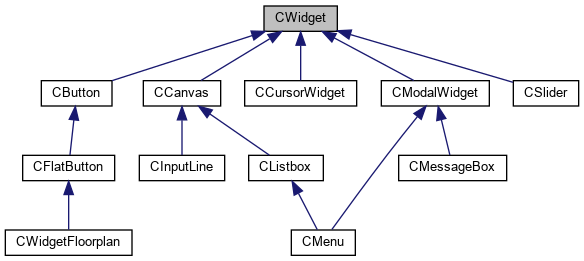|
Home2L - C/C++ API v1.4-2-g83f4c (2025-08-23)
Smart Tools for a Private Home
|
|
Home2L - C/C++ API v1.4-2-g83f4c (2025-08-23)
Smart Tools for a Private Home
|
Base class for all widgets.
This class is not abstract, but by itself allows to display arbitrary SDL surfaces.
Definition at line 94 of file ui_screen.H.
#include "ui_screen.H"

Public Member Functions | |
Setup ... | |
Coordinate transformations (screen <-> render <-> local) ... | |
Surface-oriented drawing ... | |
This class itself is able to display a non-interactive surface. | |
| void | SetSurface (SDL_Surface *_surface) |
| Set the static surface to display. The caller stays owner of surface, must not delete it as long as it is set here. The surface dimensions must match 'area'. | |
| virtual SDL_Surface * | GetSurface () |
| Get an up-to-date surface or 'NULL' if none is available. | |
Texture-oriented drawing... | |
| void | GetRenderArea (SDL_Rect *ra) |
| Transpose 'area' to the current screen coordinates to be passed to all SDL rendering functions. | |
| virtual SDL_Texture * | GetTexture () |
| Return an up-to-date texture. | |
| void | SetTextureBlendMode (SDL_BlendMode _sdlBlendMode) |
| Set the blend mode for the texture created by the default implementation of GetTexture(). The default is SDL_BLENDMODE_NONE. | |
| virtual void | Render (SDL_Renderer *ren) |
| Render this widget. | |
| void | ClearTexture () |
| Clear the internally cached texture object to save memory. | |
Event handling ... | |
| virtual bool | HandleEvent (SDL_Event *ev) |
| Handle an event and return 'true' if the event was consumed and is to be ignored by later widgets. | |
Friends | |
| class | CScreen |
| class | CCanvas |
|
virtual |
Return an up-to-date texture.
The default implementation maintains an internal texture that is updated based on the surface set by SetSurface(). Widgets that generate SDL texture objects directly may override this method.
|
virtual |
Render this widget.
The default implementation uses the 'GetTexture()' method above. By overriding this method it is possible to define widgets with a custom SDL rendering procedure, which may be more efficient than preparing a single texture containing the complete widget.
It is allowed to pass 'ren == NULL', in which case all textures and internal data structures are (re-)calculated, but nothing is actually rendered.
Reimplemented in CCanvas, CCursorWidget, CListbox, CMenu, and CInputLine.